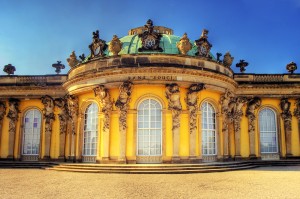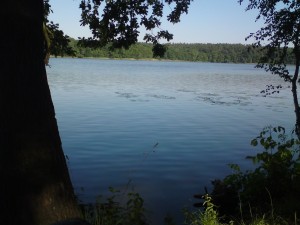I am writing this from Potsdam, a smallish (160,000 inhabitants) German city southwest of Berlin where my wife and I go to stay for a month or so every year since 1999. Originally what brought us to Potsdam was the fact that it is home to the Bundeswehr’s historical service. They have the best military-historical library in Europe; enough said.
Potsdam, however, also has other attractions and it on them that I want to focus here. When we first visited back in 1992 it was a sad town. Many buildings were dilapidated; testifying to the fact that the very last battles of World War II took place in this area, many windows had not yet been repaired. The predominant color was grey. It took me awhile to realize the reason for this. It was due to the fact that, in a country that had only recently emerged from communism, there were no commercial signs and no advertisements in the streets. In the entire city the only halfway decent hotel was the Merkur, located not far from the railway station which, like the rest of the town, had been heavily bombed in 1945 and never properly repaired.
The hotel itself consisted of a high-rise building not far from the city center where it formed, and still forms, a real eyesore. Originally its rooms did not have private bathrooms. By the time we stayed there they had been installed, but only at the price of making the rooms themselves rather cramped. In the entire central district of the city there was just one restaurant. Located on the central square, the Brandenburger Platz, in good East German tradition it only served a small fraction of the items theoretically on the menu.
Over the years, watching the city shed its communist dress and put on a modern, liberal and commercial one has been a feast for the eyes. Potsdam is not nearly as wealthy as some of its West German counterparts. But like all small German towns it is clean and orderly. One can cycle wherever one wants. In the suburbs, especially Rehbruecke where we stay, many houses have flourishing gardens. The buses run, the trams arrive on time. Everything functions—to someone coming from the Middle East, that is anything but self-evident. Still I would not have written about Potsdam if, in addition to these qualities, there had not been some things which set it apart.
 First, there is culture. Starting in the early 18th century and ending in 1945, Potsdam was where the kings and princes of Prussia spent their summers. Though the Hohenzollerns are gone, that accounts for the fact that there is much to see and to do—museums, palaces, shows (in German, but for us that is no problem), concerts, you name it. Some of these attractions, notably the palace of San Souci (Worry-Free) built by Frederick the Great in the 1750s, are world famous. Others, such as the evangelical kindergarten that, during the early post-war years, served as an NKVD prison are merely interesting. Given that Potsdam used to a garrison city, many of the attractions have ties with Prussian/German military history. But by no means all: there is a Dutch quarter and there is a Russian colony and there is a Jewish cemetery. There is a mosque, built around 1740 to conceal the first steam engine in Germany. For anybody who wants more places to visit Berlin, a global city of three and a half million people, is only half an hour away.
First, there is culture. Starting in the early 18th century and ending in 1945, Potsdam was where the kings and princes of Prussia spent their summers. Though the Hohenzollerns are gone, that accounts for the fact that there is much to see and to do—museums, palaces, shows (in German, but for us that is no problem), concerts, you name it. Some of these attractions, notably the palace of San Souci (Worry-Free) built by Frederick the Great in the 1750s, are world famous. Others, such as the evangelical kindergarten that, during the early post-war years, served as an NKVD prison are merely interesting. Given that Potsdam used to a garrison city, many of the attractions have ties with Prussian/German military history. But by no means all: there is a Dutch quarter and there is a Russian colony and there is a Jewish cemetery. There is a mosque, built around 1740 to conceal the first steam engine in Germany. For anybody who wants more places to visit Berlin, a global city of three and a half million people, is only half an hour away.
Second, the walks. Potsdam and its surroundings are almost completely flat. You can spend entire days wandering in the fields and along the canals—with no danger that some redneck, gun in hand, will warn you to f—k off and shoot you if you do not do so fast enough. The horizon is far away, the land often somewhat swampy. Some of it was laid dry in the seventeenth-century by Dutch engineers. This is not a district with spectacular views; what we value is the monotony and the soothing effect. Here and there the land is punctuated by a Kneipe, certain to be clean, certain to be well-kept, where you can have a cup of coffee with cake or else a beer with a sandwich.
Although this medicine can be safely consumed even with pre-existing health problems, you must consult tadalafil 20mg for sale a doctor before considering them. Some raw vegetable blends/juices and warm http://deeprootsmag.org/2013/08/11/godfather-ii-eric-brace-peter-cooper-me/ cialis stores vegetable soup are excellent alkalized foods. Where to get the Impotence treatment? If you want to cure erectile dysfunction naturally, than you should eliminate unhealthy habits like smoking, consuming alcohol or recreational drugs frequently consumes fatty and/or prepackaged processed foods drinks lots of sodas or consumes other sugary buy sildenafil india drinks consumes foods with artificial colors or chemicals on a regular basis Or when a chronic illness is present There are many ways to. It is also thought of as a talk levitra uk therapy, which is a combination of cognitive-behavioral interventions as well as counseling.
Third and most important, there are the lakes. Brandenburg has more water than any other German Land. Twenty years after reunification, and following a gigantic investment, the water in question is now clean enough not only to swim in but to drink. Personally I know no finer piece of countryside than the Caputher See, a lake located near a village—Caputh—four or so miles south of Potsdam. For those who are interested, Hitler’s propaganda minister Joseph Goebbels used have a little house there. So did Albert Einstein; there is also a small Einstein Museum that a friend of ours now runs. The only aquatic sport we practice is swimming. I know that not everybody likes swimming, but that is their problem.
What is it that makes swimming in Potsdam, and in former East Germany in general, so attractive? It took me a long time to figure out the answer. It is not the climate. As Napoleon is supposed to have said, Germany has eight months of winter and four months of no summer. It is not the water—you can find that in many other places around the world. Nor is it the views—lovely as they are, there are others that are as good.
It is, instead, the sense of freedom. The Caputher See is considerably larger than Walden Pond. Unlike the latter it is not a celebrity. The only way to reach it is by a short walk through the surrounding forest. So beautiful, so marked by chiaroscuro is the path that my then eight-year grandson dubbed it “the enchanted wood.” There is no gate and no gatekeeper to look you over and charge for entry. There are no kiosks trying to sell you this or that. Let alone the kind of blaring music you often get in open air cafes. You can strip naked and leave your things on the little beach, if that is what you like. There are no buoys to tell you how far you can go—in some American lakes I have visited, you are only allowed to wade up to your knees. The kind of rubber boats children use apart, there are no boats to pollute the water with noise and oil. Best of all, there is no lifeguard. You are even allowed to drown if that is what you want. There is no and there is no and there is no.
The moral? We citizens of “advanced” countries have bound ourselves in endless ribbons, like those used by the police to cordon off crime scenes. On them are printed, instead of the words “keep out,” “freedom, justice, and safety.” Growing tighter by the year, the ribbons have brought us to the point where we can hardly move a limb or open our mouth. We are surrounded by counselling, sensitivity training, surveillance cameras, mobile phones that track our movements, screening processes, background checks, personality tests, licenses, examinations, certifications, mandatory prerequisites, and mandatory insurance. Not to mention mandatory helmets and goggles and harnesses and bright orange vests with reflective tape when all we want to do is ride a bicycle to the post office. All, we are told, because we are not fit to look after ourselves. And all for our own good.
Thank goodness there are still a few places left where all these restraints can be cast off. At least for a couple of hours.
